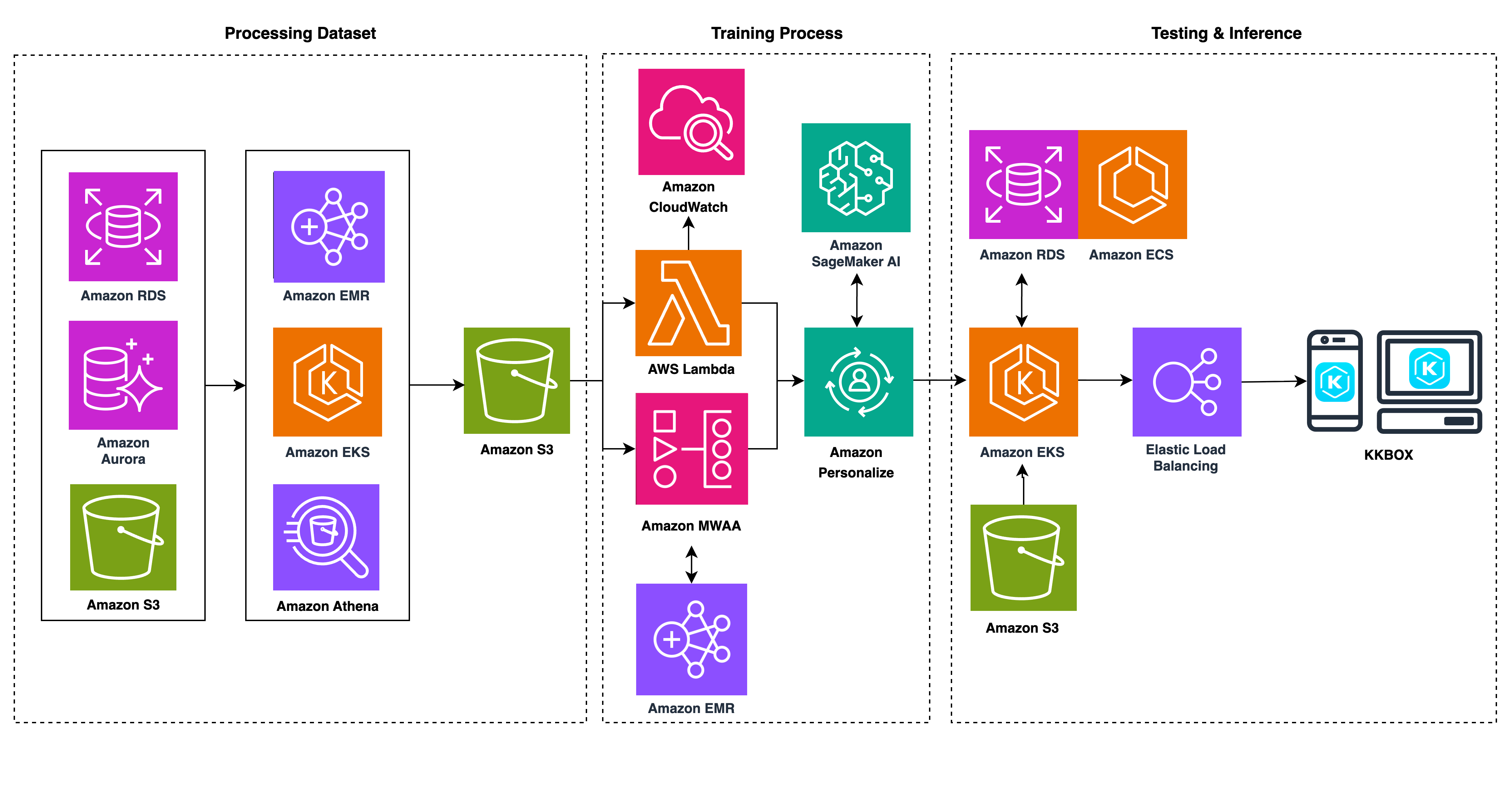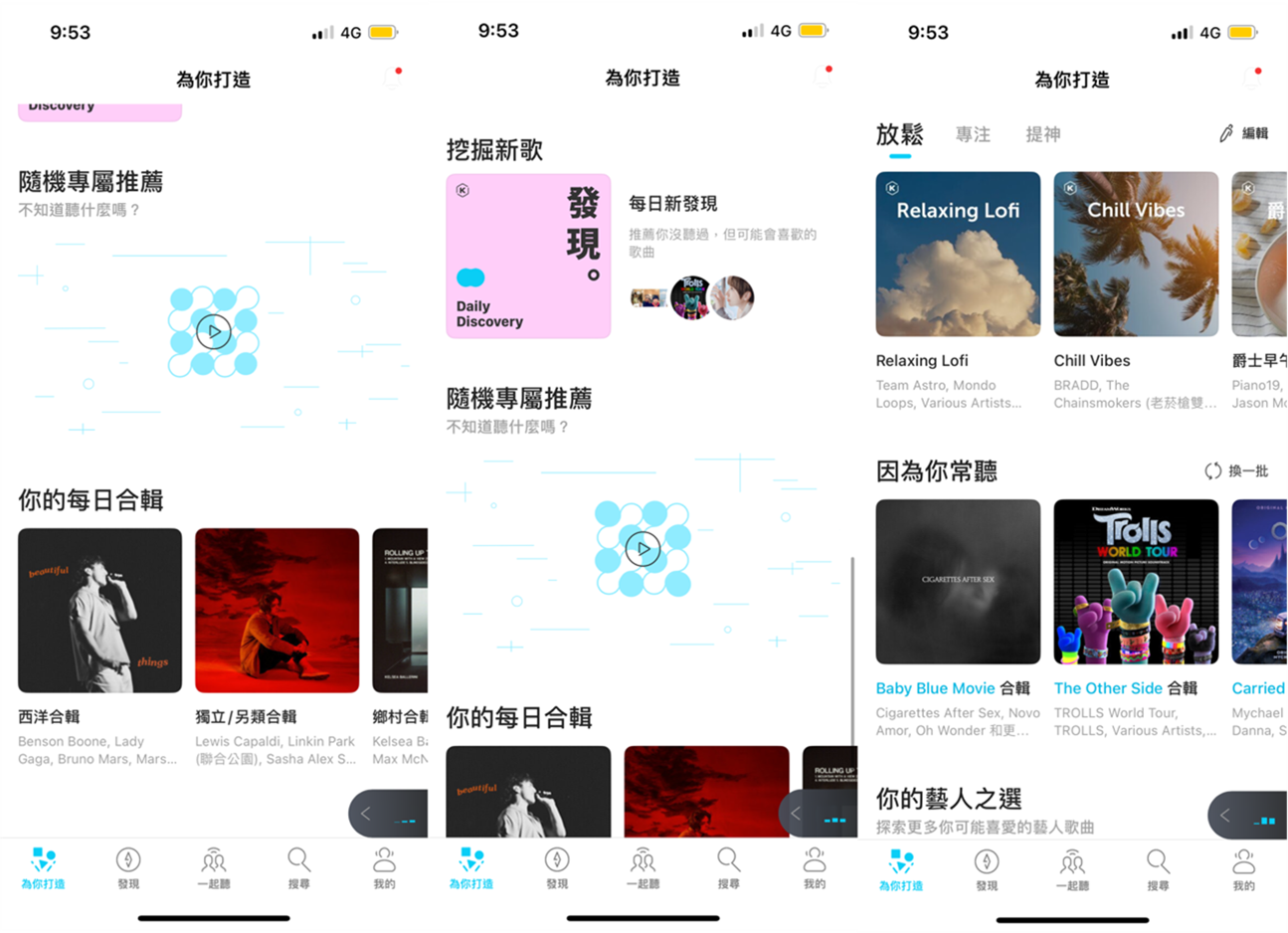AWS for M&E Blog
KKBOX enhances music recommendations with Amazon Personalize
This blog is co-authored by Abbie Lin, Assistant Manager, KKBOX.
KKBOX, the leading music streaming platform in Taiwan and across Asia, is using Amazon Personalize to elevate its recommendation engine—delivering more relevant, diverse content with less operational overhead. Serving over 12 million users across Taiwan, Hong Kong, Japan, and Singapore, KKBOX aims to deepen user engagement through smarter, more adaptive personalization.
By leveraging Amazon Personalize, KKBOX enhances the accuracy and variety of its recommendations while streamlining infrastructure and model management. This approach enriches the listening experience while reducing the manual effort required to maintain and scale their recommendation system.
Background
In the highly competitive music streaming industry, personalized recommendations play a pivotal role in user retention and engagement. KKBOX implemented Amazon Personalize, a fully managed machine learning (ML) service that transforms user data into personalized recommendations without requiring ML expertise.
Adoption of Amazon Personalize addresses a critical industry challenge: balancing recommendation accuracy with content diversity. Although accurate suggestions help users receive relevant content, diversity is essential to help prevent monotony and foster discovery. With Amazon Personalize, KKBOX streamlined its recommendation engine. The result is a richer listening experience that keeps users engaged and coming back.
Solution overview
KKBOX integrated Amazon Personalize into its core application to drive scalable, AI-powered music recommendations. Using this fully managed ML service, KKBOX built a recommendation system that dynamically adapts to user preferences while providing a balance between familiarity and exploration.
The following diagram illustrates the solution architecture.
To support the large-scale KKBOX recommendation engine, powered by Amazon Personalize, the architecture is divided into three main stages:
- Processing dataset
- Training process
- Testing and inference
This modular design facilitates scalability, manageability, and performance optimization across the data lifecycle.
- Processing dataset
In the initial phase, data is ingested from multiple sources including Amazon Relational Database Service (Amazon RDS), Amazon Aurora, and Amazon Simple Storage Service (Amazon S3). Data stored in Amazon S3 is queried with Amazon Athena for analytics. Data is then processed using distributed computing frameworks hosted on Amazon EMR and Amazon Elastic Kubernetes Service (Amazon EKS). Processed data is stored in Amazon S3, serving as a central data lake for the training pipeline.
- Training process
Processed datasets are used to train recommendation models in a scalable, serverless manner. Training orchestration is handled through Amazon Managed Workflows for Apache Airflow (Amazon MWAA), and AWS Lambda, while Amazon SageMaker is used to build and tune machine learning models. Intermediate and final datasets are further transformed using Amazon EMR. Amazon CloudWatch provides monitoring. Integration with notebooks, dashboards, and other visualization tools enables ongoing evaluation.
After evaluating multiple personalized model use cases and performance metrics, KKBOX selected the Similar-Items recipe. This approach aligned best with their goal of offering contextually relevant recommendations based on user behavior and item relationships. The resulting recommendations are surfaced on the application, improving user experience and engagement.
- Testing and inference
Once models are trained, the inference phase begins. In this phase, trained models are deployed in a containerized environment using Amazon Elastic Container Service (Amazon ECS) and Amazon EKS, with data sourced from Amazon RDS. Inference results are delivered to user interfaces—both mobile and desktop—through Amazon Elastic Load Balancing (Amazon ELB), facilitating low-latency, high-availability delivery.
Personalizing model evaluation beyond accuracy
KKBOX evaluates its recommendation system using multiple metrics, providing a holistic approach to personalization. Although accuracy remains a key focus, the company has developed a unique diversity evaluation formula inspired by industry-leading methodologies. The approach KKBOX was influenced by are the techniques discussed in the paper Model Evaluation beyond accuracy: Diversity, Serendipity, Novelty, and Coverage.
Accuracy makes sure that the recommendations align with user preferences, providing a familiar and relevant music experience. Diversity introduces varied content to encourage exploration beyond frequently played tracks. Novelty plays a key role in promoting lesser-known songs while maintaining their relevance to the listener’s taste. Coverage dynamically adjusts recommendations based on real-time user interactions, providing an adaptive and engaging experience.
The following screenshots are taken from the KKBOX app and showcase how results generated by Amazon Personalize are integrated into the user experience.
For the KKBOX use case, several rounds of experiments were conducted to help prevent overfitting and avoid the model memorizing specific columns. Overfitting can lead to an imbalance in the metrics being optimized—metrics that are essential but not directly covered by Amazon Personalize. To achieve this datasets are reduced by removing derived data, extracting location data from IP addresses, and applying one-hot encoding to categorize active periods.
Additionally, the importance level of each column from P0 to P2 are defined. This started with P0 and P1 datasets before progressively including P2 datasets, then incorporating the complete dataset while removing duplicates. Evaluations are conducted using multiple metrics beyond accuracy, including diversity, novelty, and coverage, using a formula available in a GitHub-hosted notebook.
By balancing these factors, KKBOX makes sure that users not only receive familiar music but are also exposed to fresh and engaging content. To further illustrate this approach, AWS provides a sample implementation using the MovieLens dataset for model evaluation. You can replace this dataset with your own and conduct evaluations to better understand, and optimize, your recommendation models.
Results
By leveraging the AI capabilities of AWS, KKBOX:
- Improved the weekly average full-listen user ratio to 84.97%
- Achieved a 78.30% click-to-play conversion rate after users engaged with recommended modules
- Optimized operational costs and reduced operational manpower needs by 70%
Due to efficiency gains, KKBOX can reallocate resources toward innovation while delivering richer, more personalized music experiences.
Future steps
KKBOX continues to refine its recommendation strategy, exploring new dimensions of personalization. One key initiative focuses on enhancing diversity metrics, refining models to better balance accuracy and diversity, thereby making sure that recommendations remain engaging while exposing users to a broader range of content.
To achieve this, KKBOX is considering different techniques, such as tuning recipe hyperparameters to control the trade-off between accuracy and diversity. They are also looking at applying postprocessing methods to adjust recommendation outputs, and using promotional filters to highlight specific content based on business objectives.
Additionally, KKBOX is exploring real-time personalization by implementing updates based on immediate user actions, making recommendations more dynamic and responsive. Lastly, the company aims to integrate additional AWS AI and ML services to further expand its capabilities, deepening their personalization and improving the overall user experience.
Conclusion
With Amazon Personalize, KKBOX has successfully built a customer-centric recommendation engine that balances accuracy and diversity, significantly boosting user engagement and satisfaction. As KKBOX continues its journey, AWS remains a trusted partner in driving AI-powered personalization at scale.
To explore how Amazon Personalize can transform your recommendation strategies and elevate user engagement, visit the Amazon Personalize Developer Guide and Getting started tutorials today.
Contact an AWS Representative to know how we can help accelerate your business.

